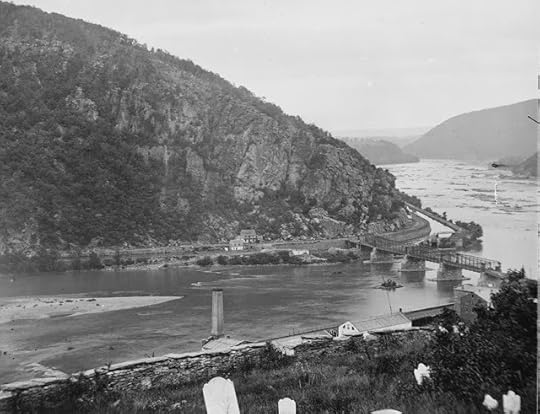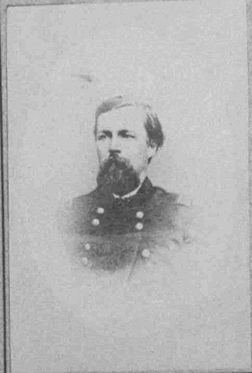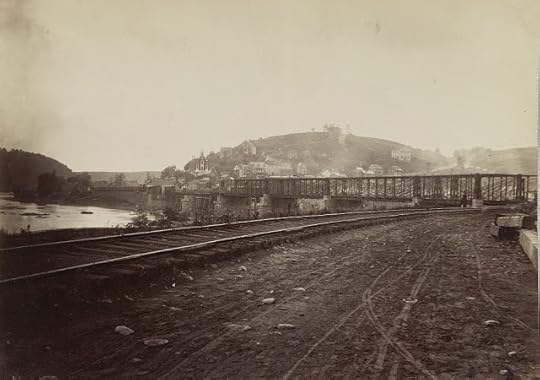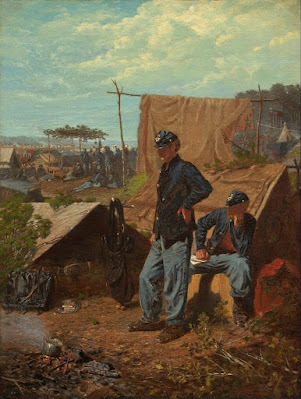Nothing to Bind Us But Honor: In the Three-Months’ Service with the 87th Ohio
There isn't much written about the wartime services of the 87th Ohio Volunteers. Mustered into service in the summer of 1862 for just a brief 90-days, the regiment first guarded prisoners at Camp Chase before being sent to Baltimore, Maryland where it took part in the 4th of July celebration. A few days later, it was sent to Harper's Ferry where it became part of the garrison.
We are fortunate in that Private William A. Bosworth of Co. A, a student of Marietta College, provided the following lengthy description of the travails of the 87th to the August 22,1862, edition of the Pomeroy Weekly Telegraph. About 5 weeks after hewrote his letter, the 87th Ohio would be surrendered as part of thegarrison of Harper’s Ferry.
 Maryland Heights as viewed from Harper's Ferry during the Civil War.
Maryland Heights as viewed from Harper's Ferry during the Civil War. Bowery Lane,Camp Banning, Harper’s Ferry, Virginia
August 4,1862
Being almost the sole representative ofold Meigs in the three months’ service and being connected with a regimentwhich has seen very many of the enjoyments and few of the hardships of soldiers’life, I may contribute my mite towards encouraging our boys to volunteer bygiving your readers a sketch of our adventures for the past two months.
When Governor Tod issued his call forvolunteers to serve for a limited period during the storm that seemed tothreaten our capitol, the citizens of Washington County called together by thepromptness and energy of Judge Putnam, chairman of the military committee, heldan enthusiastic meeting at which some 40-50 names were enrolled for 60 days.The students of Marietta College assembling at the courthouse with thecitizens, at a preconcerted signal, adjourned en masse to the College Chapelwhere after a brief deliberation, they agreed almost unanimously to holdthemselves in readiness to go.
The next day, when it was learned thatthe emergency was not so great as before supposed and that men would not beaccepted for less than 90 days, many though that duty did not call them to go.Nevertheless, we had quite a respectable company raised by night and the nextafternoon (Wednesday May 28) we started with about 75 men up the MuskingumRiver en route for Camp Chase.
I could hardly entertain you be describingat any length our trip to Columbus; I will only say that we had a pleasantjourney, finding amusement in responding to the cheers and waving ofhandkerchiefs that greeted us all along the way and withal feeling quite braveand patriotic as we attacked with valorous appetites the tables loaded withcrackers, cheese, and prime ham. We arrived at Columbus late Thursday eveningand marched up to the State House where we listened to a nice little speechfrom the governor, then marched back to the lunch of crackers and hot coffeewith quarters of the floors of an unoccupied tavern stand.
The next day, we took up quarters atCamp Chase and spent the first two weeks of our stay there in recruiting,organizing, arguing, and quarreling generally. We had come to camp entirelyunorganized and in fact, not regularly enlisted having nothing to bind us buthonor. In his call, the governor offered the choice of either going to protectWashington or remaining at Camp Chase to relieve troops doing guard duty. Thegreater portion of us, incited by a love of travel and adventure and willing toundergo danger if need be for our country, enlisted with the former intention.
But we had a few timid ones and anumber of boys who were bound by promises to their parents who intended tochoose the latter alternative. We gathered, however, from certain hints droppedby the governor that old Uncle Samuel had been more scared than hurry and thatthe dilemma now would be either to enter the general service, subject to theorders of the War Department, or the state service to be under the control ofthe governor. About three-fourths of our boys were still in favor of thegeneral service, but being induced by the persuasion of Judge Putnam and inorder to keep our company together, we at length reluctantly consented to enterthe state service and became Co. C of the 85th Ohio. We remained inthe 85th two weeks longer, making four weeks in the state service.
I presume Camp Chase is about as gooda camp as any similar one where large bodies of men congregate, though I shouldby no means recommend it as a place of summer resort. We had pretty goodshanties, very fair soldier’s grub, and the camp was well-policed but theground being bare, hard, and destitute of trees, the heat became veryoppressive when hot days did come which, thank heaven, were comparatively fewfor the season. The dust raised by the slightest breeze from the broad, flatparade ground, swept in almost blinding clouds; when the wind blew hard, thedust penetrated every crevice and cranny of our shanties. Just multiply thedust of Pomeroy by three and you will have about the product of camp Chase. Thewater, though not positively unwholesome, was not good, being strongly impregnatedwith sulfur.
 Colonel Henry Banning
Colonel Henry Banning87th and 121st Ohio
There were about 1,200-1,400 prisonersat Camp Chase. The prisons in which these men are confined are merely portionsof the camp enclosed by a close board fence 20 feet high with a walk near thetop for the guards. Our principal business at Camp Chase was, of course, toguard these prisoners- that is, to walk back and forth with a loaded guncarried in military position and keep them from coming within 10 feet of thefence. Such is the glory of state service. Among these prisoners may be foundall varieties of character from the wealthy and courteous Southern gentlemen tothe degraded ragamuffin bushwhacker. They all seem to be quiet and orderly withfew and occasional exceptions.
We soon became tired of this kind ofservice and when the opportunity of transfer was offered, about 20 of our menfrom the 85th and as many recruits we became Co. A of the 87thOhio. Our regiment was organized and ready for the march in a few days and onSunday morning, we started from camp under marching orders for AnnapolisJunction, Maryland.
Saturday afternoon we cooked our fiveday’s rations and got our troops ready. We awoke at 2 a.m. and were ready tomarch by 4. Marching from Camp Chase to Columbus for five miles was our firstand only hard march. I can assure the unsophisticated that even a five-miletramp with full knapsacks, five day’s rations, a gun, and ammunition to carryis not to be sneered at. I would as soon go 20 miles unencumbered. However, theboys bore up bravely and stepped firmly to the music as we passed through thestreets of Columbus.
We took the Ohio Central Railroad forPittsburg. What we most observed as we passed through the state was the numberand beauty of the ladies. At Newcomerstown, a mere village, there was a fullcompany of young ladies- a fine chance for young Benedicts. I suppose a portionof this praise of Ohio girls is owing to the fact that it was Sunday and thegirls were all out in their holiday attire which we passed through Pennsylvaniaon a Monday, which was wash day.
At the city of Smoke and Cinderswhere, by the way, the women are as homely as the houses, we changed cars,taking the Pennsylvania Railroad. Soon we began to ascend the mountains- up,up, along the banks of the Connewaugh, then down the Blue Juniata. There weremany fine scenes for the artist’s pencil along this route. The weather was delightfullycool and pleasant and I feasted my eyes to the full upon the grand panoramafleeting by us. The scenery on this side of the mountains is especially grand.High peaks and ridges tower blue and cloud-like in the distance. Down below us,half hidden in the trees, winds the Juniata River of song and tradition whileall varieties of mountain scenery unite to complete the picture.
Among the numerous towns upon ourroute, I must not forget to mention Huntingdon where we stopped for two orthree hours and were plentifully supplied with first-rate bread and butterwhich the ladies brought by the basket full. Well do they emulate thepatriotism of their husbands, fathers, and brothers, three companies of whomare in the service. It is their custom thus to minister to the enjoyment of allthe soldiers who pass through. God bless them! May their joys ever be asabundant as their charity is bountiful.
We arrived at Baltimore, Marylandearly Wednesday morning; we got off the cars and unslung our knapsacks,expecting to take the train for Annapolis when the order came to encamp. In themidst of a cold, drizzling rain, we pitched our tents upon a vacant space atthe northern edge of the city which we christened Camp Tod. This camp was lowand hot, but still better than Camp Chase as we had splendid water nearby and acreek upon one side and an old reservoir upon another which afforded greatconveniences for washing and bathing. Then we had a fine opportunity of seeingthe city when we could get a pass.
We had halted at Baltimore for thepurpose of being on hand on the 4th of July in case of a riot. Letme describe our day. At 4:30, we routed out and marched to town without our breakfastsand around the Washington Monument while everybody was asleep but a fewNegroes, draymen, etc. Squad and company drill in the morning and in theafternoon our first battalion drill for about two hours. Then about 5 o’clockanother tramp down the stony streets in the broiling sun and around the bigpile of white rocks, taking off our hats and giving cheers cheer at everystripe of the red, white, and blue which we couldn’t see for the sweat that pouredoff our faces. I must confess that when Colonel [Henry] Banning made us alittle speech and told us this was the proudest day of his life, we felt verymuch like the frog in the fable although we cheered him, of course.
 Harper's Ferry, Virginia
Harper's Ferry, Virginia On Wednesday July 9th wereceived marching orders again, this time for Harper’s Ferry. Three days ofrations to cook, another knapsack drill through Baltimore, a ride in the hogcars, and daylight finds us nearing Harper’s Ferry. As we turn a sharp curveapproaching this place, suddenly a most magnificent scene bursts upon thesight. Where the Potomac and Shenandoah unite their waters, they have cut adeep, narrow gorge through a ridge 700-800 feet high, leaving an almostperpendicular rocky wall upon either side. These rivers present quite asingular appearance. They are rather broad and quite swift, dotted thickly withrocks forming innumerable little water falls so that they presented a spottedappearance at a little distance. The scenery as you look up the Shenandoah isthe finest I ever beheld.
Again, in a drizzling rain we selectedour campground and pitched our tents. I will describe as well as I can oursituation and surroundings. Take as a starting point a street a mile in lengthrunning northeast and southwest through the towns of Harper’s Ferry andBolivar; the Ferry being at the northeast where this street divided the rightangle formed by the two rivers, the Potomac running east and the Shenandoahnorth. The town of Harper’s Ferry occupies the point formed by the rivers; theruins of the old arsenal buildings extending along both banks. Strongfortifications bristling with cannon extend across from stream to stream. Thetown of Bolivar is higher and extends along the street first mentioned. Here weare encamped about a mile from the Ferry in advance of the troops here.
Between us and the Potomac is a ridge. East across thePotomac from the Ferry are the Maryland Heights, halfway up which is a batteryof artillery with its guard of infantry. On the top of these heights is alookout built by the Secesh from which you can see the whole country for 20-30miles around. Ridges as high as our Pomeroy hills appear to be mereinequalities in the surface of a great valley which lies outstretched like amass at our feet. It is a view which will richly repay any one for the labor ofascent. South of us across the Shenandoah are the Louden Heights where we cansee some spiked guns, formerly a masked battery of our men. The troopsstationed here besides our men are the 12th and 22nd NewYork regiments, parts of a Maryland and Delaware regiment, and severalcompanies of artillery and cavalry.
We have had a good time since we have been here. Our camp isa very fine one with plenty of elbow room and a nice grassy drill ground. Whenwe first came to camp, we could get plenty of cherries from deserted premises.We now get apples and pears in the same way while picking blackberries andhuckleberries in the woods. For the past two weeks, our principal amusement hasbeen the construction of bowers of pine and cedar. I presume 10,000 loads ofbushes have been dragged into camp by our boys. We have built bowers in frontof all our quarters and fitted them up with seats and tables of Secesh boards.
We have built a tabernacle for meetings 40 feet by 80 feet,but the finest bower is one built by Co. A in front of the colonel’s quarters. Apine tree 8 inches in diameter is planted in the center, the upper boughs beingleft on; 8 smaller ones are set at equal distances from this, the raftersextended in a slanting direction to the center pole. Cross ticks are laid uponthese and the whole thickly covered with pine boughs. The center pole is finelyornamented with cedar full of berries and an octagonal seat is put up. Thestars and stripes float upon the top of the center pole.

The bowers of our company are constructed upon a similarpattern but are not so fancy. I do not suppose we suffer as much from the heatas you do at home. We have no drills now after 8 in the morning or before 6 inthe evening. The rest of the time we can spend in our arbors. Besides we are onpretty high ground and have a cool breeze almost all the time.
As to the drill of our regiment, I will only say that we werehighly complimented by both General Wool and Colonel Dixon Miles at the reviewof the troops stationed here. Everybody says we have made very great progressfor the time we have been in the service. We do not expect to see any fightingbefore our time is expired though our boys are ready and, in fact, ratheranxious for a fight. Colonel Miles says that though the New York boys arebetter drilled, he would depend principally upon us in an emergency.
Our staff officers are all good men and well liked. Colonel HenryBanning is a captain in the service on a three month furlough. He is a goodmilitary man, very kind and sociable, and thoughtful of the interests of hismen but still strict enough in discipline. Lieutenant Colonel John Faskin is aScotchman with a voice like a lion and an air of unflinching courage which hasbeen well-tried, too. He was an adjutant in the service [67th Ohio]and won laurels at Winchester. Major Leffingwell was in the Mexican War and isthe best drilled man of the three. Surgeon Barr from the 36th Ohiois a No. 1 physician.
Our regiment is to be reorganized whenour time is out. I suppose our friends will be anxious to know what we aregoing to do. It seems to be settled than unless an emergency arises, we are toremain where we are until our regiment is taken back to Ohio to be reorganized.Rumors, many tongued, daily brings as to the time of our return and the placeto which we will be taken. The latest authentic report is that we are goingback to Camp Chase the last of next week to be immediately discharged and amonth’s furlough given to those who reenlist. Our term of enlistment does notexpire until the 10th of September.
[As things turned out, the 87th Ohio did not reorganize, the men disgusted by the way in which they were caught up in the surrender of the Harper's Ferry garrison on September 15, 1862, 5 days after the expiration of their term of service. Upon their arrival as paroled prisoners of war at Camp Douglas in Chicago, the men successfully lobbied to be sent home to Ohio where they were mustered out in early October 1862. William's older brother Milton Bosworth served in the 53rd Ohio and died of disease in March 1863. After his service with the 87th Ohio, William became a minister and died in Kansas in 1936, aged 94.]
Source:
Letter fromPrivate William A. Bosworth, Co. A, 87th Ohio Volunteer Infantry, PomeroyWeekly Telegraph (Ohio), August 22, 1862, pg. 1
Daniel A. Masters's Blog
- Daniel A. Masters's profile
- 1 follower



